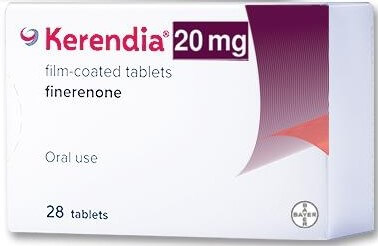Kerendia
$ 100.00
Kerendia is a medication that can reduce the risk of complications for adults suffering from chronic kidney disease due to type 2 diabetes.
Kerendia (generic name: finerenone) belongs to the class of drugs called nonsteroidal mineralocorticoid receptor antagonists (MRAs). Finerenone reduces the risk of complications in adults suffering from stage 3 and 4 chronic kidney disease (CKD) associated with type 2 diabetes.
Type 2 diabetes can damage the kidneys because high blood sugar levels can injure the blood vessels and filtering cells (nephrons) in the kidneys. People with diabetes can also develop chronic high blood pressure, which can damage the kidneys as well.
Untreated kidney disease may result in: Worsening kidney function Heart attack or cardiac failure Risk of hospitalization for heart failure End-stage kidney disease Cardiovascular incidents or stroke Kerendia is available only as a brand-name medication. It is not currently available in generic form. Dosage: The treating physician will determine the starting dosage based on several factors, such as kidney function as measured by the estimated glomerular filtration rate (eGFR), blood potassium level, and other medications being taken simultaneously.
Reviews
Write a review
The product has no reviews
Leave your review

